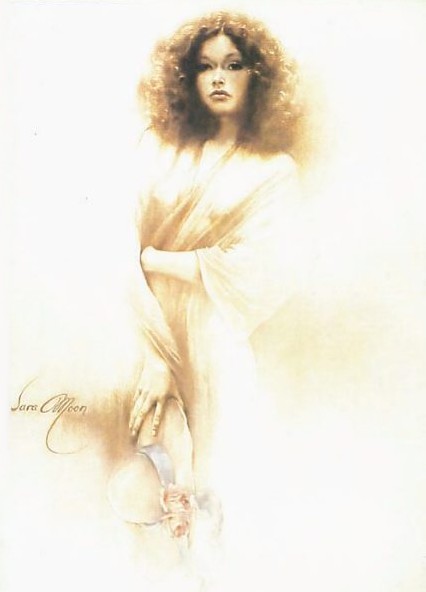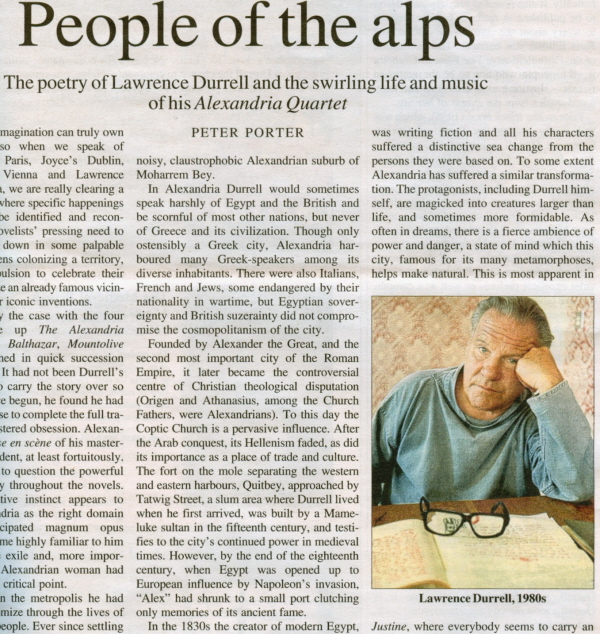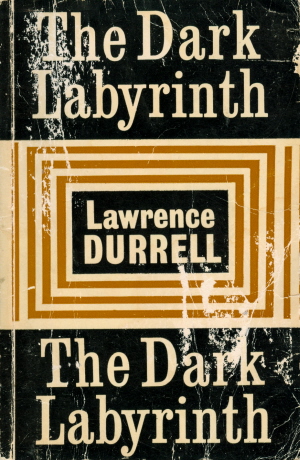|
Ghi
|
… một cuốn tiểu thuyết của
Durrell, nàng tặng chàng hôm sinh nhật,
với những dòng chữ, giống như một nữ tốc ký ghi lại một cuộc nói
chuyện, nàng
ghi lại những lời chàng nói bữa đó, "Buồn, dễ giận, kiêu ngạo, yêu anh
không, kìa anh hỏi H. mà. Em là cái máy magnétophone. Không nghĩ (được
vậy, H.
đã mừng).... ", chàng giành lấy cây viết ghi thêm: "Em là ma vie...
quà tặng của H. (nhân dịp H. giận)";
Cuốn của Durrell, quà tặng nhân
dịp H giận là cuốn Cefalu, bản tiếng Pháp.
Tra google:
Durrell's
subsequent fiction
explores the people and places of the Mediterranean
that he came to know so well. Cefalu (1947; later retitled The Dark
Labyrinth)
is a satirical portrait of a group of English tourists who are for a
time
trapped in the Cretan labyrinth, home to the legendary Minotaur.
Nguồn gốc
của Tứ Khúc
Alexandria.
Trên
TLS, 22 & 29 2008, có
một bài viết tuyệt vời của Porter, về Tứ
Khúc Alexandria, của Durrell,
nguồn hứng
khởi của Tứ Khúc Lan Hương & Sài Gòn của Gấu.
Bài viết sẽ được dùng như một
introduction [dẫn
vào] ấn bản mới của Tứ
Khúc, của nhà xb Folio Society. Porter sử
dụng một số
thông tin từ cuốn Alexandria:
City of memory, Thành phố của hồi nhớ, của Michael Haag.
Ông này, sau khi đọc bài của
Porter, phúc đáp, bổ túc một số chi tiết [TLS 5 Tháng Chín, 2008]
Haag cho biết, cuốn đầu tay của
Durrell không phải The Black Book.
Porter hiểu
lầm câu nói của Durrell. Durrell coi
The
Black Book, là, “The first real book”, the one in which “I first
heard
the
sound of my own voice” [cuốn sách đầu, thực… cuốn sách đầu tiên tôi
nghe ra giọng
của riêng tôi”]. Trước đó, ông có, tệ lắm cũng hai cuốn rồi:
Pied
Pier of Lovers (1935), và Panic
Spring (1937).
Nhưng thú vị nhất, là, sau
khi nghe ra giọng của mình, ông bèn làm một hơi, Tứ Khúc.
Tứ Khúc thoạt đầu
có tên Cuốn sách của Những Người Đã
Chết, The Book of the Dead.
Ui chao, đúng là cái tên đích
thực của Tứ Khúc Lan Hương &
Saigon.
Những người đã chết? Ba triệu
người.
Nếu tính Lan Hương nữa, thì là ba triệu lẻ một.
Tính thêm Gấu nữa, là ba triệu lẻ hai người!
Tứ tấu khúc

Tứ Tấu Khúc
Alexandria
Alexandria
Quartet
So
we, learning to suffer and not condemn
Và
chúng ta học đau khổ, không học kết tội
No
single imagination can truly own a city
Chẳng
có một tưởng tượng đơn độc nào có thể sở hữu một thành phố.
Sài
Gòn đâu của chi riêng mi, mà còn của BHD.

*
Đọc
vậy đủ rồi. Viết đi.
Chẳng cần đọc nữa.
Nhớ, những ngày mới qua xứ
lạnh, gặp lại cô bạn, và nghe cô ra lệnh.
-Viết về 'chúng ta'? Chữ sao quá
chậm ? (1)
(1) Tôi
viết kể từ khi em
đọc,
Ôi chữ sao quá chậm, so với
cuộc tình của chúng ta.
J'écris depuis que tu me
lis,
Les
mots sont en retard sur
nos vies.
Cầm Dương Xanh
Nhưng,
nhắc tới Durrell, mà
làm sao bỏ qua bạn của ông, Henry Miller?
Số TLS đã dẫn quả là còn một
bài nhìn lại Henry Miller, bằng cách đọc "Những Tân Thánh Kinh", New
Bibles, tức tác phẩm của Miller, của Anais Nin, bạn gái của ông, bà này
sợ còn
dzâm hơn cả Miller, và của Durrell.
Henry Miller viết trong Thế
giới của Sex, những xen huê tình, erotic scenes, trong những
cuốn sách của ông,
tương tự như những phép lạ của Chúa Ky Tô, trong Thánh Kinh.
Nin có một câu Gấu rất mê, và
đã từng chép, để tặng Gấu Cái:
Mi giống như một con Gấu:
Tất cả sự êm ái dịu dàng được bọc bằng một cái vỏ
cứng cỏi, cùng với sự sần sùi tuyệt vời của nó, khiến ta chảy tan ra.
Ta thật
là buồn vì nhà ngươi chẳng bao giờ chịu khó hiểu ta thêm một chút. Tại
sao mi
không cố hiểu thêm về ta, mà cứ thế ngưng lại, dậm chân tại chỗ?
Chiều hôm qua, ta tự hỏi,
làm
thế nào, để ta có thể chứng tỏ cho mi thấy, là ta yêu thương mi biết là
chừng
nào. Làm sao chứng tỏ cho mi biết, bằng một phương tiện cho dù mắc mỏ
cỡ nào
đối với ta, rằng ta thương mi?
Và ta chỉ tìm ra được một
phương tiện, đó là gửi tiền cho mi, để mi đi chơi với con mụ đàn bà nào
đó.
Gấu Cái.
Thư của Anais Nin, bồ của
Henry Miller, có sửa đổi chút đỉnh, cho hợp với tình cảnh vợ chồng Gấu!
[Tu es comme l'ours, Henry:
tout de douceur dans une enveloppe de dureté, avec une délicieuse
rugosité
suave qui me fait fondre...]

The story of
The Dark Labyrinth conveys its characters
to Crete: it is a modern novel about
modern
people, but not without echoes of the Minos legend. The writing has the
brilliance, gusto and imagination that Mr. Durrell's numerous admirers
would
expect.
*
… một
cuốn tiểu thuyết của
Durrell, nàng tặng chàng hôm sinh nhật,
với những dòng chữ, giống như một nữ tốc ký ghi lại một cuộc nói
chuyện, nàng
ghi lại những lời chàng nói bữa đó, "Buồn, dễ giận, kiêu ngạo, yêu anh
không, kìa anh hỏi H. mà. Em là cái máy magnétophone. Không nghĩ (được
vậy, H.
đã mừng).... ", chàng giành lấy cây viết ghi thêm: "Em là ma vie...
quà tặng của H. (nhân dịp H. giận)"
Thời Gian
Cuốn của
Durrell, "quà tặng
nhân
dịp H giận" là Cefalu,
bản tiếng Pháp, và cũng là
tên đầu tiên của nó, bản tiếng Anh, 1947, sau đổi là Mê cung u tối, trên.
Tra
google: Durrell's
subsequent fiction
explores the people and places of the Mediterranean
that he came to know so well. Cefalu
(1947; later retitled The Dark
Labyrinth)
is a satirical portrait of a group of English tourists who are for a
time
trapped in the Cretan labyrinth, home to the legendary
Minotaur.
*
Sources for the 'Alexandria Quartet'
Nguồn Tứ Khúc Alexandria
Sir, -
Peter Porter has
written an interesting article on Lawrence Durrell and the writing of
the
Alexandria Quartet (Commentary, August 22 & 29), which is to appear
as the
introduction to a new edition of the Quartet to be published by the
Folio
Society. As he has kindly acknowledged my history of the cosmopolitan
city and
its writers (Alexandria: City of memory, 2004), from which he drew some of his
information, I feel I ought to set the record straight on a few
misleading and
factually incorrect statements made in an otherwise illuminating piece.
Porter
describes The Black Book (1938) as Durrell's first
piece of fiction, but he has misunderstood Durrell who called it "my
first
real book", the one in which "I first heard the sound of my own
voice". There were, as Durrell implies, earlier fictional works,
including
two full length novels, Pied Piper of Lovers
(1935) and Panic Spring
(1937), but he did not
regard them as authentic literary works and their interest is confined
to those
wanting to trace Durrell's first footsteps. He would not allow them to
be
republished, but they have been recently resurrected by an academic
press and,
as chance would have it, they were reviewed by Karl Orend in the same
issue of
the TLS as Peter Porter's piece.
After
writing The Black Book Durrell began what would
become his greatest achievement and to which he gave the working title "The Book of the Dead". This
eventually emerged as Justine (1957),
which was followed by those brilliant improvisations, Balthazar
(1958), Mountolive
(1958) and Clea (1960), which grew
into the Alexandria Quartet.
It is true, as Porter notes,
that Durrell had not intended to write a quartet, thought he later
liked to say
he had conceived one from the start. He had not thought beyond Justine, and it was this one volume
alone that he described, even as he was writing it in Cyprus,
as
"4-dimensional". The woman who changed everything was Claude
Vincendon, of the Jewish Alexandrian banking family Menasce (not
Menasche). But
it was not because she imposed order on his notes; Justine
was all but complete when she and Durrell met in Cyprus
in 1955,
but she provided the information and inspiration to turn a single
volume into a
quartet.
Durrell and Claude had not
previously met in Alexandria, but he
had known
members of her family there during the war, and when she walked into
his life
in Nicosia she revealed to him that
they had
been secretly pursuing Zionist activities in Egypt,
which included financing immigration and arms to Palestine under the noses of the
British.
Durrell, who had been working at the British Information Office in
Alexandria
in the rue Toussoun (not rue Chérif Pasha) and who was close to people
in
British intelligence, might have been expected to know about this
Palestine
plot, but he did not, and the revelation overturned his impressions of
Alexandrian reality (just as Darley's sense of reality alters through
the
volumes that succeed Justine) and led
Durrell to conceive the notion of using Claude's uncle George de
Menasce and other
Zionnist members of her family as models for the fictional Nessim
Hosnani and
his family, whom Durrell implausibly portrays as pro-Zionist Copts in
the Quartet.
Durrell
was not the "son
of colonial officials in India";
his father, a self-made man, was an exceptionally enterprising civil
engineer
who built everything from bridges and railways to hospitals, steel
mills and
model towns across the length and breadth of the Raj.
After leaving Alexandria, Durrell
worked as an information officer in Rhodes,
which had been liberated by the British from a
brutal German occupation. He lived there with Eve Cohen, a young
Alexandrian
who was his secretary and became his second wife, and he began
Reflections on a
Marine Venus (1953) there but did not complete it until several years
later
while he was press officer at the British embassy in Belgrade. His
mother did
not come to Rhodes, but while writing Justine
in Cyprus,
Durrell relied on her help in caring for his daughter Sappho after her
mother,
Eve, the model for Justine, had a mental breakdown and was recuperating
in England.
Justine was written against the background of EOKA bombings, and
Durrell hardly
had time to find relaxation there by writing Bitter Lemons (1957); that
was
written near Donhead St Andrew in Dorset where Durrell and Claude spent
the
winter of 1956-7, after they had left Cyprus and before they settled in
France -
where Durrell wrote the remainder of the Alexandria Quartet and
immortalized
that "ambiguous white metropolis".
MICHAEL
HAAG
81A
Belsize London NW3
TLS 5 Tháng Chín 2008
Nguồn Tứ Khúc Lan Hương
& Sài Gòn
Gấu đọc
Faulkner, Durrell,
J.H. Chase, Lefèbvre... là đúng lúc đang có BHD. Khi nằm nhà thương
Grall, em
mang đến cuốn Un beau matin d'été,
của Chase. Cuốn này đã lên phim, tài tử mặt
ngựa Jean-Paul Belmondo đóng [anh già mới ly dị vợ sau hai chục năm
chung sống,
là vì cả hai vợ chồng muốn bảo vệ cho một bé gái, Stella, tờ Paris
Match số mới
nhất, 11-17 Sept 2008, có đi một bài về vụ này, cũng mùi lắm].
Cefalu, quà tặng
sinh nhật
Gấu, sau cú Mỹ Cảnh:
.... sau đúng một năm trời, vào
đúng lúc chàng gặp tai nạn, bị thương nặng, xuýt chết, sau khi thoát
chết, ra
khỏi nhà thương lần đầu tiên, vị bác sĩ hẹn hai tháng sau trở lại để
tháo
plâtre và giải phẫu thêm một lần nữa, vào đúng dịp sinh nhật của chàng,
sinh
nhật lần thứ ba mươi mà cũng là sinh nhật lần thứ nhất, nàng nói, "Je
serai ta femme."
Thời Gian
|
|



